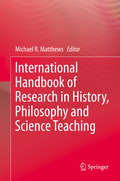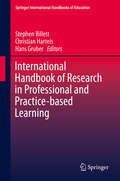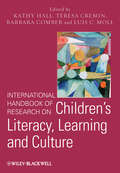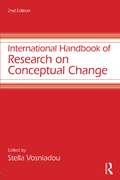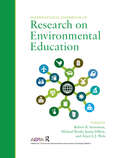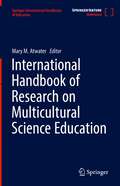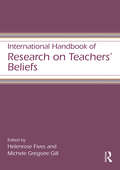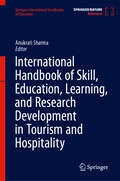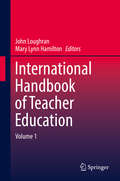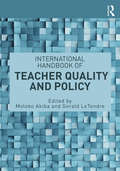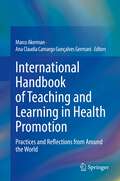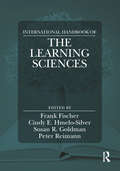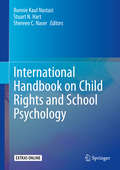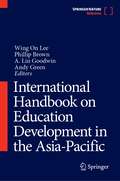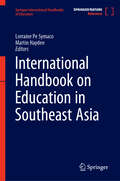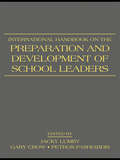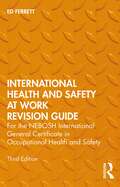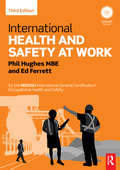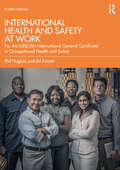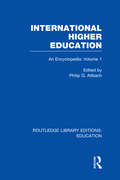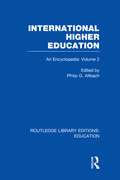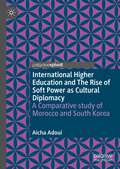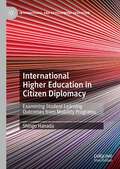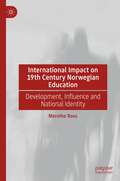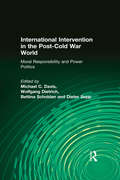- Table View
- List View
International Handbook of Research in History, Philosophy and Science Teaching
by Michael R. MatthewsThis inaugural handbook documents the distinctive research field that utilizes history and philosophy in investigation of theoretical, curricular and pedagogical issues in the teaching of science and mathematics. It is contributed to by 130 researchers from 30 countries; it provides a logically structured, fully referenced guide to the ways in which science and mathematics education is, informed by the history and philosophy of these disciplines, as well as by the philosophy of education more generally. The first handbook to cover the field, it lays down a much-needed marker of progress to date and provides a platform for informed and coherent future analysis and research of the subject. The publication comes at a time of heightened worldwide concern over the standard of science and mathematics education, attended by fierce debate over how best to reform curricula and enliven student engagement in the subjects. There is a growing recognition among educators and policy makers that the learning of science must dovetail with learning about science; this handbook is uniquely positioned as a locus for the discussion. The handbook features sections on pedagogical, theoretical, national, and biographical research, setting the literature of each tradition in its historical context. It reminds readers at a crucial juncture that there has been a long and rich tradition of historical and philosophical engagements with science and mathematics teaching, and that lessons can be learnt from these engagements for the resolution of current theoretical, curricular and pedagogical questions that face teachers and administrators. Science educators will be grateful for this unique, encyclopaedic handbook, Gerald Holton, Physics Department, Harvard University This handbook gathers the fruits of over thirty years' research by a growing international and cosmopolitan community Fabio Bevilacqua, Physics Department, University of Pavia
International Handbook of Research in Professional and Practice-based Learning
by Stephen Billett Christian Harteis Hans GruberThe International Handbook of Research in Professional and Practice-based Learning discusses what constitutes professionalism, examines the concepts and practices of professional and practice-based learning, including associated research traditions and educational provisions. It also explores professional learning in institutions of higher and vocational education as well the practice settings where professionals work and learn, focusing on both initial and ongoing development and how that learning is assessed. The Handbook features research from expert contributors in education, studies of the professions, and accounts of research methodologies from a range of informing disciplines. It is organized in two parts. The first part sets out conceptions of professionalism at work, how professions, work and learning can be understood, and examines the kinds of institutional practices organized for developing occupational capacities. The second part focuses on procedural issues associated with learning for and through professional practice, and how assessment of professional capacities might progress. The key premise of this Handbook is that during both initial and ongoing professional development, individual learning processes are influenced and shaped through their professional environment and practices. Moreover, in turn, the practice and processes of learning through practice are shaped by their development, all of which are required to be understood through a range of research orientations, methods and findings. This Handbook will appeal to academics working in fields of professional practice, including those who are concerned about developing these capacities in their students. In addition, students and research students will also find this Handbook a key reference resource to the field.
International Handbook of Research on Children's Literacy, Learning and Culture
by Luis C. Moll Barbara Comber Teresa Cremin Kathy HallThe International Handbook of Research in Children's Literacy, Learning and Culture presents an authoritative distillation of current global knowledge related to the field of primary years literacy studies.Features chapters that conceptualize, interpret, and synthesize relevant researchCritically reviews past and current research in order to influence future directions in the field of literacyOffers literacy scholars an international perspective that recognizes and anticipates increasing diversity in literacy practices and cultures
International Handbook of Research on Conceptual Change: International Handbook Of Research On Conceptual Change (Educational Psychology Handbook)
by Stella VosniadouConceptual change research investigates the processes through which learners substantially revise prior knowledge and acquire new concepts. Tracing its heritage to paradigms and paradigm shifts made famous by Thomas Kuhn, conceptual change research focuses on understanding and explaining learning of the most the most difficult and counter-intuitive concepts. Now in its second edition, the International Handbook of Research on Conceptual Change provides a comprehensive review of the conceptual change movement and of the impressive research it has spawned on students’ difficulties in learning. In thirty-one new and updated chapters, organized thematically and introduced by Stella Vosniadou, this volume brings together detailed discussions of key theoretical and methodological issues, the roots of conceptual change research, and mechanisms of conceptual change and learner characteristics. Combined with chapters that describe conceptual change research in the fields of physics, astronomy, biology, medicine and health, and history, this handbook presents writings on interdisciplinary topics written for researchers and students across fields.
International Handbook of Research on Environmental Education
by Justin Dillon Robert B. Stevenson Michael Brody Arjen E.J. WalsThe environment and contested notions of sustainability are increasingly topics of public interest, political debate, and legislation across the world. Environmental education journals now publish research from a wide variety of methodological traditions that show linkages between the environment, health, development, and education. The growth in scholarship makes this an opportune time to review and synthesize the knowledge base of the environmental education (EE) field. The purpose of this 51-chapter handbook is not only to illuminate the most important concepts, findings and theories that have been developed by EE research, but also to critically examine the historical progression of the field, its current debates and controversies, what is still missing from the EE research agenda, and where that agenda might be headed. Published for the American Educational Research Association (AERA).
International Handbook of Research on Multicultural Science Education (Springer International Handbooks of Education)
by Mary M. AtwaterThis handbook gathers in one volume the major research and scholarship related to multicultural science education that has developed since the field was named and established by Atwater in 1993. Culture is defined in this handbook as an integrated pattern of shared values, beliefs, languages, worldviews, behaviors, artifacts, knowledge, and social and political relationships of a group of people in a particular place or time that the people use to understand or make meaning of their world, each other, and other groups of people and to transmit these to succeeding generations. The research studies include both different kinds of qualitative and quantitative studies. The chapters in this volume reflect differing ideas about culture and its impact on science learning and teaching in different K-14 contexts and policy issues. Research findings about groups that are underrepresented in STEM in the United States, and in other countries related to language issues and indigenous knowledge are included in this volume.
International Handbook of Research on Teachers' Beliefs (Educational Psychology Handbook)
by Helenrose Fives Michele Gregoire GillTeacher beliefs play a fundamental role in the education landscape. Nevertheless, most educational researchers only allude to teacher beliefs as part of a study on other subjects. This book fills a necessary gap by identifying the importance of research on teacher beliefs and providing a comprehensive overview of the topic. It provides novices and experts alike a single volume with which to understand a complex research landscape. Including a review of the historical foundations of the field, this book identifies current research trends, and summarizes the current knowledge base regarding teachers’ specific beliefs about content, instruction, students, and learning. For its innumerable applications within the field, this handbook is a necessity for anyone interested in educational research.
International Handbook of Skill, Education, Learning, and Research Development in Tourism and Hospitality (Springer International Handbooks of Education)
by Anukrati SharmaThis handbook provides new dimensions and directions to design tourism education curriculums and transform students' learning. It delves into issues such as job opportunities, business opportunities, required skill sets, and the role of critical and creative thinking in tourism education, and focuses on a shift in mindset from R&D (research and development) to L&D (learning and development), to aid in gaining in-the-field knowledge. It presents a global perspective on the latest trends, innovative curriculum, research, and skill needs in the travel, tourism, and hotel industry via empirical, theoretical, and conceptual chapters, as well as through global case studies. This handbook explores how to develop the skills, attributes and prospects for employment in these competitive industries, and also highlights what employers in the tourism and hospitality sectors expect from graduate and/or post-graduate candidates. Besides examining the contribution of tourism education towards a better society, this handbook introduces a new way of designing curriculums, and examines the past practices, current trends, and future opportunities in the field.
International Handbook of Teacher Education, Volume 1
by Mary Lynn Hamilton John LoughranThe International Handbooks of Teacher Education cover major issues in the field through chapters that offer detailed literature reviews designed to help readers to understand the history, issues and research developments across those topics most relevant to the field of teacher education from an international perspective. This volume is divided into two sections: The organisation and structure of teacher education; and, knowledge and practice of teacher education. The first section explores the complexities of teacher education, including the critical components of preparing teachers for teaching, and various aspects of teaching and teacher education that create tensions and strains. The second examines the knowledge and practice of teacher education, including the critical components of teachers’ professional knowledge, the pedagogy of teacher education, and their interrelationships, and delves into what we know and why it matters in teacher education.
International Handbook of Teacher Quality and Policy
by Gerald K. LeTendre Motoko AkibaThe International Handbook of Teacher Quality and Policy is a comprehensive resource that examines how teacher quality is conceptualized, negotiated, and contested, and teacher policies are developed and implemented by global, national, and local policy actors. Edited by two of the leading comparative authorities in the field, it draws on the research and contributions of scholars from across the globe to explore five central questions: How has teacher quality been conceptualized from various disciplinary and theoretical perspectives? How are global and transnational policy actors and networks influencing teacher policies and practices? What are the perspectives and experiences of teachers in local policy contexts? What do comparative research studies tell us about teachers and how their work and policy contexts influence their teaching? How have various countries implemented policies aimed at improving teacher quality and how have these policies influenced teachers and students? The international contributors represent a wide variety of scholars who identify global dynamics influencing policy discourses on teacher quality, and examine national and local teaching and policy environments influencing teacher policy development and implementation in various countries. Divided into five sections, the book brings together the latest conceptual and empirical studies on teacher quality and teacher policies to inform future policy directions for recruiting, educating, and supporting the teaching profession.
International Handbook of Teaching and Learning in Health Promotion: Practices and Reflections from Around the World
by Marco Akerman Ana Claudia Camargo Gonçalves GermaniThis international handbook brings together researchers and teachers from 25 countries of the five continents to share their experiences of teaching health promotion in undergraduate and graduate courses related to different health professions. Chapter authors share teaching methodologies used in classes, discuss the competencies students need to learn and indicate research opportunities. Readers will be provided with real-world examples of empowering, participatory, holistic, intersectoral, equitable and sustainable teaching/learning strategies that aim to improve health and reduce health inequities. This handbook was edited by an editorial board formed by 12 members of the International Union for Health Promotion and Education (IUHPE) from seven countries – Brazil, Belgium, Canada, Israel, New Zealand, Taiwan and UK –, and includes 45 chapters organized in seven thematic sections, each one dedicated to a different aspect of the process of teaching and learning health promotion: The health promotion curriculum Making health promotion relevant to practice Pedagogies for health promotion Special topics for health promotion Health promotion assessment and quality assurance Health promotion as a transformational practice Students’ reflections The International Handbook of Teaching and Learning in Health Promotion: Practices and Reflections from Around the World aims to encourage a dialogue between teaching and learning practices carried out locally and the possibilities of replicating these experiences globally, recognizing cultural differences and similarities. This handbook is intended for a wide range of readers, including education and training providers, health professionals and health care students. Due to its intersectoral and interdisciplinary approach, it will also be of interest to teachers and students in other fields of the Social Sciences, such as Urban Planning, Social Work, Public Policy, International Relations and Population Studies.
International Handbook of the Learning Sciences
by Peter Reimann Frank Fischer Cindy E. Hmelo-Silver Susan R. GoldmanThe International Handbook of the Learning Sciences is a comprehensive collection of international perspectives on this interdisciplinary field. In more than 50 chapters, leading experts synthesize past, current, and emerging theoretical and empirical directions for learning sciences research. The three sections of the handbook capture, respectively: foundational contributions from multiple disciplines and the ways in which the learning sciences has fashioned these into its own brand of use-oriented theory, design, and evidence; learning sciences approaches to designing, researching, and evaluating learning broadly construed; and the methodological diversity of learning sciences research, assessment, and analytic approaches. This pioneering collection is the definitive volume of international learning sciences scholarship and an essential text for scholars in this area.
International Handbook on Child Rights and School Psychology
by Bonnie Kaul Nastasi Stuart N. Hart Shereen C. NaserThis handbook examines the meanings, implications, and transformative potential of a child-rights approach for school psychology. It focuses on the school community, in which psychology is committed to promoting well-being, learning, and development of all children. The handbook begins with an overview of the 1989 United Nations Committee on the Rights of the Child (CRC) and explores main themes such as, survival, protection, development, participation, and nondiscrimination. Chapters provide guidance in promoting and protecting child rights when dealing with critical issues relevant to the school community, including well-being, freedom from violence, and access to high quality education. In addition, chapters analyze and offer recommendations for child rights applications within the roles and responsibilities of school psychologists. The handbook concludes with future directions for achieving a child-rights approach for school psychology. Topics featured in this handbook include:The current status of child rights in the international community.Accountability for child rights by school psychology.Collaborative home, school, and community practices aimed at promoting family support.Protecting child rights within the realm of competitive sports.CRC and school-based intervention programming.Promoting child rights through school leadership.Applying child rights-respecting research to the study of psychological well-being. The International Handbook on Child Rights and School Psychology is a must-have resource for researchers, scientist-practitioners, clinicians, and graduate students in child and school psychology, educational policy and politics, social work, public health, and other school-based or child-serving mental health disciplines.
International Handbook on Education Development in the Asia-Pacific
by A. Lin Goodwin Wing On Lee Andy Green Phillip BrownThe Springer International Handbook of Educational Development in Asia Pacific breaks new ground with a comprehensive, fine-grained and diverse perspective on research and education development throughout the Asia Pacific region. In 13 sections and 127 chapters, the Handbook delves into a wide spectrum of contemporary topics including educational equity and quality, language education, learning and human development, workplace learning, teacher education and professionalization, higher education organisations, citizenship and moral education, and high performing education systems. The Handbook is grounded in specific Asia Pacific contexts and scholarly traditions, using unique country-specific narratives, for example, Vietnam and Melanesia, and socio-cultural investigations through lenses such as language identity or colonisation, while offering parallel academic discourse and analyses framed by broader policy commentary from around the world.
International Handbook on Education in Southeast Asia (Springer International Handbooks of Education)
by Martin Hayden Lorraine Pe SymacoThis International Handbook provides a detailed account of the education systems of 11 Southeast Asian nations, including Brunei Darussalam, Cambodia, Indonesia, Lao People’s Democratic Republic, Malaysia, Myanmar, the Philippines, Singapore, Thailand, Timor- Leste, and Vietnam. It presents a systematic sector-by-sector explanation of how these national education systems deliver educational services and respond to national and international issues and challenges. With 56 chapters, the International Handbook is the region’s most comprehensive educational reference source. In the first of its chapters, the editors introduce the regional context and draw attention to the distinctive characteristics of each of the 11 systems. Southeast Asia, representing 8.5% of the world’s population, is as dynamic as it is diverse. The International Handbook charts progress and establishes a benchmark for documenting future developments. It also provides a stepping-off point for more detailed investigations of decision-making processes and outcomes across the 11 national education systems.
International Handbook on the Preparation and Development of School Leaders
by Petros Pashiardis Jacky Lumby Gary CrowSponsored by the University Council of Educational Administration (UCEA), the British Educational Leadership, Management, and Administration Society (BELMAS), and the Commonwealth Council for Educational Administration and Management (CCEAM), this is the first book to provide a comprehensive and comparative review of what is known about the preparation and development of primary and secondary school leaders across the globe. It describes current issues and debates and offers an assessment of where the field of leadership development is headed. Key features include the following: Global Focus: this book provides the first comprehensive look at leadership preparation and development across the globe. The chapter authors are distinguished scholars, drawn from the US, UK, Europe, Asia, Canada, Australia/New Zealand, and Africa. Topical & Geographical Focus: provides researchers and policymakers with critical descriptions and assessments of both topical and geographical areas. International Expertise: chapter contributors are drawn from a variety of theoretical perspectives and represent all major continents.
International Health and Safety at Work Revision Guide: for the NEBOSH International General Certificate in Occupational Health and Safety
by Ed FerrettThis companion to the renowned International Health and Safety at Work textbook by Hughes and Ferrett is an essential revision aid for students preparing for their written assessments on the NEBOSH International General Certificate in Occupational Health and Safety. Fully updated to the 2019 specification, the revision guide provides complete coverage of the syllabus in bite-sized chunks, helping readers to learn and memorise the most important topics. Throughout the book, the guide links back to the International Health and Safety at Work textbook, helping students to consolidate their learning. Small and portable making it ideal for use anywhere – at home, in the classroom or on the move – the revision guide suggests useful tips on study and examination technique. It includes practice questions and answers based on NEBOSH exam questions, providing everything you need for productive revision in one handy reference. Now in its third edition, the International Health and Safety Revision Guide, written by the renowned health and safety author and former NEBOSH Vice Chairman Ed Ferrett, is an invaluable tool for students as they prepare for their NEBOSH exam and for their subsequent health and safety work.
International Health and Safety at Work: for the NEBOSH International General Certificate in Occupational Health and Safety
by Phil Hughes Ed FerrettInternational Health and Safety at Work has been specially written in simple English for the thousands of students who complete the NEBOSH International General Certificate in Health and Safety each year. Fully revised in alignment with the April 2015 syllabus, this third edition provides students with all they need to tackle the course with confidence. Clear, easily accessible information is presented in full colour, with discussion of essential principles such as ILO and OSH conventions as well as legal frameworks from a range of countries. Aligned to the NEBOSH International General Certificate in Occupational Health and Safety Practice questions and answers to test knowledge and increase understanding Complete with a companion website containing extra resources for tutors and students at www.routledge.com/cw/hughes The only textbook endorsed for the NEBOSH International General Certificate in Health and Safety, International Health and Safety at Work remains the most effective tool for those working to fit international health and safety standards to local needs and practice.
International Health and Safety at Work: for the NEBOSH International General Certificate in Occupational Health and Safety
by Ed Ferrett Phil Hughes MBEInternational Health and Safety at Work has been specially written in simple English for the thousands of students who complete the NEBOSH International General Certificate in Health and Safety each year. Fully revised in alignment with the 2019 syllabus, this fourth edition provides students with all they need to tackle the course with confidence. Clear, easily accessible information is presented in full colour, with discussion of essential principles such as ILO and OSH conventions as well as legal frameworks from a range of countries. The book features practice questions and answers to test knowledge and increase understanding. International Health and Safety at Work remains the most effective tool for those working to fit international health and safety standards to local needs and practice.
International Higher Education Volume 1: An Encyclopedia (Routledge Library Editions: Education)
by Philip G. AltbachThis encyclopedia is the result of a highly selective enterprise that provides a careful selection of key topics in essays written by top scholars in their fields. Comprehensive and in-depth coverage of a limited number of countries, regions and themes is provided. The essays not only feature statistical and factual information but significant interpretation of those facts and figures. The chapters on themes and topics are both analytic and interpretative and deal with the most important topics relevant to higher education everywhere. More than a compendium of facts and figures the encyclopedia is a comprehensive overview of a growing field of research and analysis.
International Higher Education Volume 2: An Encyclopedia (Routledge Library Editions: Education)
by Philip G. AltbachThis encyclopedia is the result of a highly selective enterprise that provides a careful selection of key topics in essays written by top scholars in their fields. Comprehensive and in-depth coverage of a limited number of countries, regions and themes is provided. The essays not only feature statistical and factual information but significant interpretation of those facts and figures. The chapters on themes and topics are both analytic and interpretative and deal with the most important topics relevant to higher education everywhere. More than a compendium of facts and figures the encyclopedia is a comprehensive overview of a growing field of research and analysis.
International Higher Education and The Rise of Soft Power as Cultural Diplomacy: A Comparative study of Morocco and South Korea
by Aicha AdouiThis book offers a comprehensive analysis of international higher education and soft power as cultural diplomacy, through a study of Morocco and South Korea. It draws on extensive original research to explore the social, political, and economic factors that have shaped the international standing of both countries in terms of higher education. The research reveals the importance of higher education in promoting soft power and the role of international universities in enhancing the international reputation of a country. The book's key findings demonstrate the impact of soft power as cultural diplomacy on international relations and the contribution it makes to research in the field of international higher education.
International Higher Education in Citizen Diplomacy: Examining Student Learning Outcomes from Mobility Programs (International and Development Education)
by Shingo HanadaThis volume presents the impacts of international higher education on citizen diplomacy. Based on the assumption that international higher education is a key driving factor of citizen diplomacy, the empirical studies in this book examine the learning outcomes of five mobility programs of international higher education(inbound study abroad, outbound study abroad, international service-learning, international internship, and online study abroad) in cultivating students’ intercultural competence, empathy and goodwill towards people in the host country. It contributes to increasing awareness of international higher education by providing insights about its functions in citizen diplomacy.
International Impact on 19th Century Norwegian Education: Development, Influence and National Identity
by Merethe RoosThis book examines Norwegian education throughout the course of the 19th century, and discusses its development in light of broader transnational impulses. The nineteenth century is regarded as a period of increasing national consciousness in Norway, pointing forward to the political independency that the country was granted in 1905. Education played an important role in this process of nationalisation: the author posits that transnational – for the most part Scandinavian – impulses were more decisive for the development of Norwegian education than has been acknowledged in previous research. Drawing on the work of educator and school bureaucrat Hartvig Nissen, who is recognised as the most important educational strategist in 19th century Norway, this book will be of interest to scholars of the history of education and Norwegian education more generally.
International Intervention in the Post-Cold War World: Moral Responsibility and Power Politics
by Wolfgang Dietrich Michael C. Davis Bettina ScholdanInternational intervention on humanitarian grounds has been a contentious issue for decades. First, it pits the principle of state sovereignty against claims of universal human rights. Second, the motivations of intervening states may be open to question when avowals of moral action are arguably the fig leaf covering an assertion of power for political advantage. These questions have been salient in the context of the Balkan and African wars and U.S. policy in the Middle East. This volume undertakes a serious, systematic, and broadly international review of the issues.
